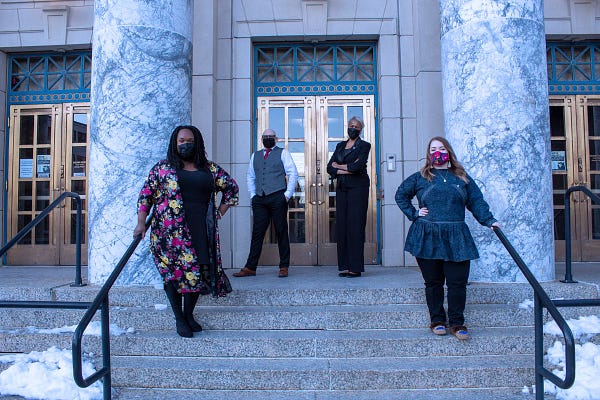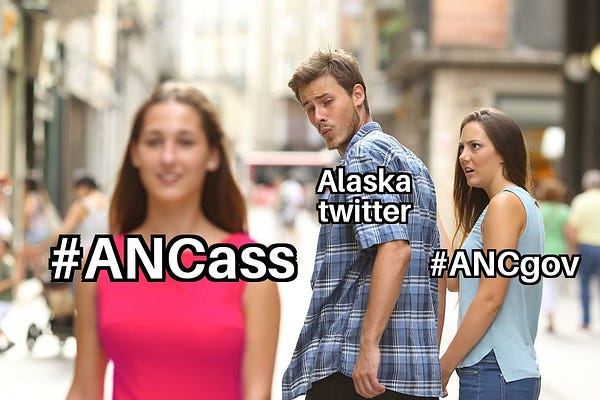The bullied pulpit
Right-wing covid-denying Sen. Lora Reinbold’s first Senate Judiciary Committee probably didn’t go how she wanted. Oil taxes get a bump, and the Senate Democrats stand united.
Good morning, Alaska! It’s Day 10 of the 32nd Alaska Legislature, Sen. Lora Reinbold found out that with great platforms come great responsibilities and the House is still unorganized. Day 9 was the most legislative-y day yet, providing me a much-needed break from thinking about Nazi license plates and their defenders.
While there was plenty of substantive stuff said on Wednesday, there was really nothing quite like the Senate Judiciary Committee hearing chaired by Eagle River Sen. Lora Reinbold. Reinbold spent much of the last year using Facebook to spread doubt and disinformation about the coronavirus, reserving most of her ire for Republican Gov. Mike Dunleavy’s “tyrannical” (largely toothless to the rest of us) public health orders and was ready to hit the ground running with her new platform courtesy of the GOP Senate Majority.

I could write an entire Friday in the Sun about just this meeting but for sanity’s sake, here’s the bullet points:
The opening included a scattershot overview of the U.S. Constitution’s Bill of Rights with parenthetical about how Reinbold felt they applied to the pandemic and the heath orders issued by government.
The featured speaker was one Dr. Martin Kulldorff, a Harvard Medical School professor behind the widely mocked “Great Barrington Declaration” that argues that lockdowns are pointless and we should be pursuing herd immunity. With support from definitely real medical professionals like Professor Spongebob Squarepants, Dr. Wear Themask, Dr. Person Fakename and Real World contestant Johnny Bananas (which is what happens when you seek signatures through an online form, you know exactly how all important health policies are built), Reinbold gave Dr. Kulldorf a free platform to pitch his plan—which hasn’t been working so well in his home country of Sweden—and limited committee members to two questions. It seemed largely in service of proving Reinbold’s point that lockdowns were pointless, never mind Kulldorf’s own admission that flattening the curve to maintain health care capacity and vaccines are an integral part of the plan.
Then we were treated to about 10 minutes of Reinbold free riffing on all the public health orders, which she has had her staff collect in 10 thick binders, that she disapproves of. She seemed particularly scornful of a guidance from the Department of Health and Social Services about how far cars should be parked for drive-in church services and safety measures for putting together giftable Easter Baskets (more on this later).
Reinbold complained several times throughout the meeting that the Dunleavy administration hadn’t made available everyone she wanted—a burn that I thought was reserved for the House Bipartisan Coalition, which saw eight or nine of their covid hearings boycotted last year—but it turns out that when your meeting contains about 10 minutes of you free riffing on all the public health orders you don’t like doesn’t leave a lot of time in a meeting anyways. Several state officials on the line were never called upon.
We did, however, get to hear from DHSS Commissioner Adam Crum—a man who up until Wednesday had seemed woefully under qualified for the position—who was greeted by Reinbold slamming her fist on one of the binders telling Crum, “Your name is on almost every single thing in this book." The administration was clearly prepared and knew what they were walking into, and Crum delivered a thorough if albeit somewhat glossy overview of the state’s efforts to respond and managed to run out the clock on the hearing. He even addressed the guidance on church parking and Easter baskets, saying it was produced while working with churches that wanted to be safe during the pandemic. Leave it to Reinbold’s Judiciary Committee to have you saying “Thank God, Adam Crum is here.”
None of this was what Reinbold wanted to hear and she noted several times that she wanted Crum for a free ranging question and answer session but instead gave him the opportunity to present without interruption (the same opportunity offered to Dr. Squarepants). With time running out on the meeting, Reinbold defiantly asked Crum if he’s sworn to uphold the U.S. Constitution to which he responded “Yes, ma’am, absolutely, I’m an American!”
Reinbold, laying out the plan for the committee moving forward: “You guys have had front and center for 10 months, you’ve had the media, everybody eating out of your hand for the last 10 months. This was and opportunity for question and answer in my committee so I gave you tremendous leeway, next time it will not be this way. … It’s really, really important to never forget what our founding fathers did, what the oppression that they dealt with and what the pilgrims and founding fathers and the oppression they dealt with and what they did to fight and die for the freedoms that we have now and a lot of the freedoms have been very, very much under attack over the last 10 months. It’s a very serious issue and so the public will have an opportunity to talk about the impacts on the unemployment, how many people are unemployed, how many businesses have gone under, the people who have not gotten their screenings, the suffering of the elderly, the suffering of the children. There’s another side to the impacts of what you guys have done.”
Oh, and if you haven’t guessed by now, Reinbold has very serious concerns about the safety of the vaccine that, no joke, she said she’s been monitoring on Facebook: “People need to know if they have the right to say ‘no’ to these vaccinations.”
Crum: “Madame Chair, if I may, 100 percent. Gov. Dunleavy and myself have been very adamanet that the state of alaska does not mandate or require vaccines for employees, staff or seniors. People have that ability, it’s a personal choice.”Reinbold: “We’re going to be digging into that at a future date.”
Why it matters: This is a bad look for Reinbold and a bad look for the Senate Majority that has given her this platform. One legislator told me afterward that this sort of thing can’t keep happening throughout session. Short of removing Reinbold from the committee chairmanship, which would open up a whole other can of worms, I’m not sure how that’s going to happen. What’s particularly frustrating, though, is that there really are constitutional questions about some of the orders as well as how the governor has continued to extend his emergency declaration outside of the law as Juneau Democratic Sen. Jesse Kiehl said during the Senate Democrats’ news conference earlier in the day: “Are we using the least restrictive means to accomplish the public health and safety needs of Alaskans? Now, least-restrictive means has to mean the least-restrictive effective means, but I think when we talk about public health requirements or mandates, when we talk about limitations on private businesses, we need to be very careful.”
A caucus with priorities
Speaking of the Senate Democrats’ news conference, they had one where they did the remarkable thing of stating a clear series of platform and priorities for the session: police reforms, substance abuse treatment, clean drinking water, protecting Power Cost Equalization, strengthening education (K-12 and the university), oil and gas tax reform, protecting the Alaska Marine Highway System and renewable energy. It’s in stark contrast to the “We’ll figure it out as we go along” plan of the GOP-led Senate Majority.
Sen. Elvi Gray-Jackson landed a great line: “What an honor it is to be part of a caucus that really has a vision for Alaska.” Gray-Jackson is carrying a big slate of police reform measures that she stressed were put together with the input of many stakeholders, including law enforcement, and said "We have everybody on board. ... We're ready to go and move forward with these bills this session."
Why it matters: The Senate Democrats are clearly focused and keenly aware of the precarious spot the Senate Republican majority is in. Once the Republicans’ internal division over key issues starts to show, I think they’ll find themselves in a critical spot to drag session across the finish line. Just what they’ll get for their help has yet to be seen, but Minority Leader Tom Begich said that he’s got assurances that Democratic bills will be heard “fully and fairly” this session.


Oil taxes
The Senate Finance and Resources committees heard an update on oil production and oil revenue. The most remarkable takeaway was the growing dissatisfaction with the performance of the tax cuts contained in Senate Bill 21 when the decline is, as Senate Finance co-chair Sen. Bert Stedman noted, looks a lot like what the projected decline was when they were having these discussions a decade ago before Senate Bill 21 passed. I don’t think it necessarily is a winning hand for reopening oil tax debate, particularly given comments from Sens. Peter Micciche and Natasha von Imhof that were very accommodating to the industry with von Imhof saying at one point, “The goal for Alaska is for us to still support the oil industry as it’s our backbone.”
Sen. Lyman Hoffman, D-Bethel, was particularly skeptical about the whole talk of supporting the industry: “Sen. von Imhof asked what should we do. Look at what we did. We passed Senate Bill 21 with the promise to fill the oil line … but in previous slides we’ve seen that we’re going to slip below 500,000 barrels a day below that and approaching 350,000 and further.” He called this slide that shows declining production with a nearly invisible line for under development fields: “One of the most depressing slides in this whole presentation.”
Hoffman raised the question of how the Legislature should approach oil production in Alaska. Should it be positioning its tax policy with new development in mind—something that hasn’t really paid off—or in managing a harvest mode out of the state where they eke out as much oil out of the existing infrastructure as possible.
Why it matters: The Legislature is in need of new revenue of some kind and no matter of PFD education raffles or Gamestop stock is going to be the solution on its own. Faced with the tough political sell of a broad-based tax, there’s likely some interest at examining oil taxes but just how much there will be when the oil industry still wields incredible political sway in the building has yet to be seen.
So long #ANCass
What started with my joke about #ANCHass being the solution to Anchorage’s lack of a Twitter hashtag turned into the just-as-silly #ANCass before the adults in the room came in and told us to stop being so childish and also #ANCgov is fine.
On the agenda
Thursday, Jan. 28
9 — Senate Finance hears the state revenue forecast. (It isn’t looking good.)
3:30 — Senate State Affairs holds what was supposed to be its second hearing on Chair Sen. Shower’s voter suppression bill SB 39. No public testimony scheduled at this hearing.
7 — Gov. Mike Dunleavy’s State of the State address. This will be delivered digitally on his Facebook page in what’s a far more meaningful gesture about the pandemic than he’s shown pretty much any time during the past 10 months.






